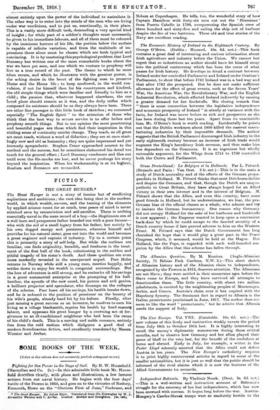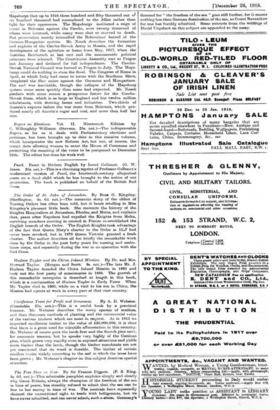Independent Bohemia. By Vladimir Nosek. (Dent. 3s. 6(1. net.) —This
is a well-written and instructive account of Bohemia's struggle for the recovery of her lost independence, which has now been crowned with success. It began long before the war. Austria. Hungary's Czecho-Slovak troops were so resolutely hostile to the Hapsburgs that up to 1916 three hundred and fifty thousand out of six hundred thousand had surrendered to the Allies rather than fight for their oppressors. The Hapsburgs instituted a reign of terror in Bohemia against the Czechs, over twenty thousand of whom were interned, while many were shot or starved to death. But persecution merely intensified the Bohemians' hatred of the German-Hungarian system. Mr. Nosek describes the formation and exploits of the Czecho-Slovak Army in Russia, and the rapid development of the agitation at home from May, 1917, when the Austrian Reichsrath at last met and the innumerable political prisoners were released. The Constituent Assembly met at Prague last January and declared for full independence. The Ozecho- Slovak National Council was formed at Prague in July. The Haps- burgs could do nothing to stem the flood. The Congress of Rome in April, at which Italy had come to terms with the Southern Slays, completed the Slav union against the Germans and Hungarians. The end was inevitable, though the collapse of the Hapsburg system came more quickly than some had expected. Mr. Nosek predicts with some reason a prosperous future for the Czecho- Slovak State, which is as large as England and has twelve million inhabitants, with thriving farms and industries. Two-thirds of Austria's exports before the war came from Bohemia, which pro- duced nearly all Austria's sugar and coal, and more than half her iron.



























 Previous page
Previous page